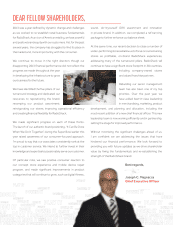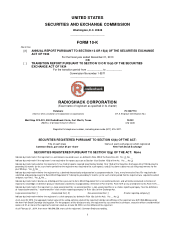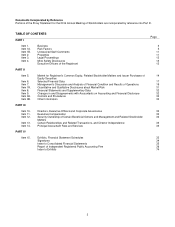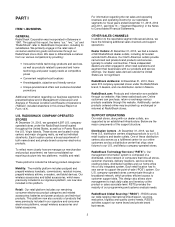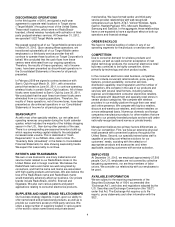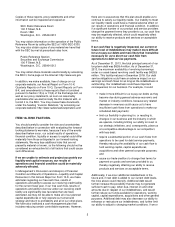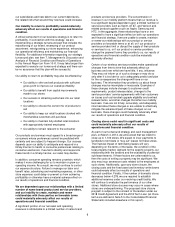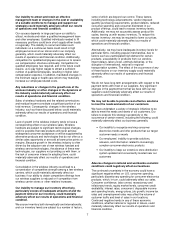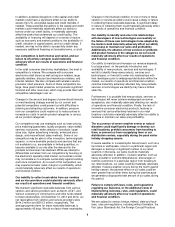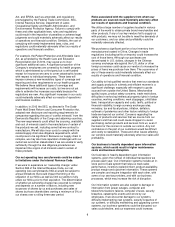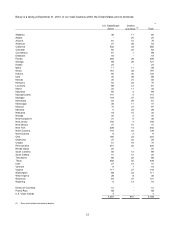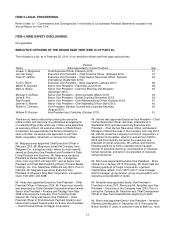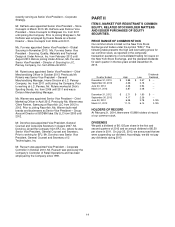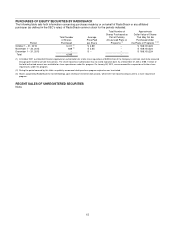Radio Shack 2013 Annual Report Download - page 9
Download and view the complete annual report
Please find page 9 of the 2013 Radio Shack annual report below. You can navigate through the pages in the report by either clicking on the pages listed below, or by using the keyword search tool below to find specific information within the annual report.7
Our inability to attract and retain an effective
management team or changes in the cost or availability
of a suitable workforce to manage and support our
strategies could materially adversely affect our results
of operations and financial condition.
Our success depends in large part upon our ability to
attract, motivate and retain a qualified management team
and other employees. Qualified individuals needed to fill
necessary positions could be in short supply either locally
or regionally. The inability to recruit and retain such
individuals on a continuous basis could result in high
employee turnover at our stores and in our company
generally, which could materially adversely affect our
results of operations and financial condition. Additionally,
competition for qualified employees requires us to assess
our compensation structure continually. Competition for
qualified employees has required, and in the future could
require, us to pay higher wages to attract a sufficient
number of qualified employees, resulting in higher labor
compensation expense. In addition, mandated changes in
the minimum wage or health care reform may materially
increase our employee-related costs.
Any reductions or changes in the growth rate of the
wireless industry or other changes in the dynamics of
the industry could materially adversely affect our
results of operations and financial condition.
Sales of wireless handsets and the related commissions
and residual income constitute a significant portion of our
total revenue. Consequently, changes in the wireless
industry, such as those discussed below, could materially
adversely affect our results of operations and financial
condition.
Lack of growth in the wireless industry tends to have a
corresponding effect on our wireless sales. Wireless
handsets are subject to significant technological changes,
and it is possible that new products will never achieve
widespread consumer acceptance or will be supplanted by
alternative products and technologies that do not offer us a
similar sales opportunity or are sold at lower price points or
margins. Because growth in the wireless industry is often
driven by the adoption rate of new wireless handset and
wireless service technologies, the absence of these new
technologies, our suppliers not providing us with them, or
the lack of consumer interest in adopting them, could
materially adversely affect our results of operations and
financial condition.
Consolidation in the wireless industry could lead to a
concentration of competitive strength among a few wireless
carriers, which could materially adversely affect our
business if our ability to obtain competitive offerings from
our wireless suppliers is reduced or if competition from
wireless carrier stores or other retailers increases.
Our inability to manage our inventory effectively,
particularly excess or inadequate amounts of and the
payment terms for our inventory, could materially
adversely affect our results of operations and financial
condition.
We source inventory both domestically and internationally,
and our inventory levels are subject to a number of factors,
some of which are beyond our control. These factors,
including technology advancements, vendor-imposed
quantity purchasing requirements, product defects, reduced
consumer spending and consumer disinterest in our
product offerings, could lead to excess inventory levels.
Additionally, we may not accurately assess product life
cycles, leaving us with excess inventory. To reduce this
excess inventory, we may be required to lower our prices,
which could materially adversely affect our results of
operations and financial condition.
Alternatively, we may have inadequate inventory levels for
particular items, including popular merchandise, due to
factors such as unanticipated high demand for certain
products, unavailability of products from our vendors,
import delays, labor unrest, untimely deliveries, or the
disruption of international, national or regional
transportation systems. The effect of the occurrence of any
of these factors on our inventory supply could materially
adversely affect our results of operations and financial
condition.
We do not have long-term arrangements with respect to the
payment terms with most of our suppliers. Any significant
changes in the payment terms that we have with our key
suppliers could materially adversely affect our results of
operations and financial condition.
We may not be able to provide cost-effective solutions
to meet the needs and wants of our customers.
We have undertaken a variety of strategic initiatives to be
able to meet the needs and wants of our customers. Our
failure to execute this strategy successfully or the
occurrence of certain events, including the following, could
materially adversely affect our business generally:
• Our inability to recognize evolving consumer
electronics trends and offer products that our target
customer needs or wants
• Our employees’ inability to provide solutions,
answers, and information related to increasingly
complex consumer electronics products
• Our inability to keep our extensive store distribution
system updated and conveniently located near our
customers
Adverse changes in national and world-wide economic
conditions could negatively affect our business.
The continued uncertainty in the economy could have a
significant negative effect on U.S. consumer spending,
particularly discretionary spending for consumer electronics
products, which, in turn, could adversely affect our sales.
Consumer confidence, labor unrest, recessionary and
inflationary trends, equity market levels, consumer credit
availability, interest rates, consumers’ disposable income
and spending levels, energy prices, job growth, income tax
rates and unemployment rates may affect the volume of
customer traffic and level of sales in our locations.
Continued negative trends in any of these economic
conditions, whether national or regional in nature, could
materially adversely affect our results of operations and
financial condition.


